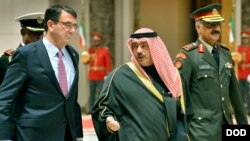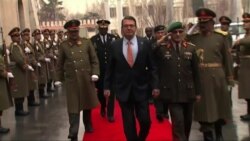His nomination was barely confirmed, but within hours new U.S. Secretary of Defense Ashton Carter was jetting off to Afghanistan and Kuwait. He met with U.S. troops, top officials in the region and vowed to go after militants of the so-called Islamic State, Carter has had plenty of experience having previously served as a top Pentagon official, and experts say on his first trip as Secretary of Defense, Carter was looking for perspective.
“What he needs to get up on are things that have moved along since he was last in office, which was only a year ago,” said veteran U.S. diplomat James Dobbins, who served as Ambassador to the European Union and a special envoy to Afghanistan before becoming a senior fellow at the RAND Corporation.
Drastic changes
The military obstacles have changed drastically over the last year. In Europe, Russia continues to agitate in volatile Ukraine. In the Middle East, Islamic State militants overran large parts of Iraq and Syria. And after more than a decade, the United States ended its combat mission in a fragile Afghanistan, the secretary’s first stop.
In Carter’s meeting with Afghan President Ashraf Ghani, he said the U.S. priority in the country was to ensure “progress sticks.” He said the U.S. would stay focused on “helping train, advise and assist the Afghan national security forces, as well as a counter-terrorism mission against al-Qaida and its remnants.”
Carter chose Kuwait as his second stop to discuss the IS threat in a meeting with senior U.S. officials in the region, calling them his "Team America."
Strategy
“The purpose of this meeting was not to create results,” said Pentagon spokesman Col. Steve Warren. “ The purpose of this meeting was to inform the secretary about the strategy, about the status of the situation throughout the region and for the secretary to gain a firsthand understanding of this fight against ISIL.”
Carter gave no indication during his trip that the coalition needed to overhaul its strategy. In Kuwait he proclaimed the coalition would gain "lasting defeat” against the brutal IS group.
As Carter spoke, Iraqi forces prepared for an assault to push the jihadist group out of the town of al-Baghdadi. The contested Anbar town is near a key air base where U.S. Marines are training Iraqi forces.
Carter starts his term with potential conflicts on three fronts, when the U.S. military was built to face threats from just two. He also faces the threat of sequestration at home, which could shrink the military budget down to its smallest amount in about 50 years, according to Ambassador Dobbins.
“We face perhaps not as large a threat as we once did, but certainly a more diverse threat, a more complex threat,” Dobbins said.
WATCH: Related video report by Carla Babb







